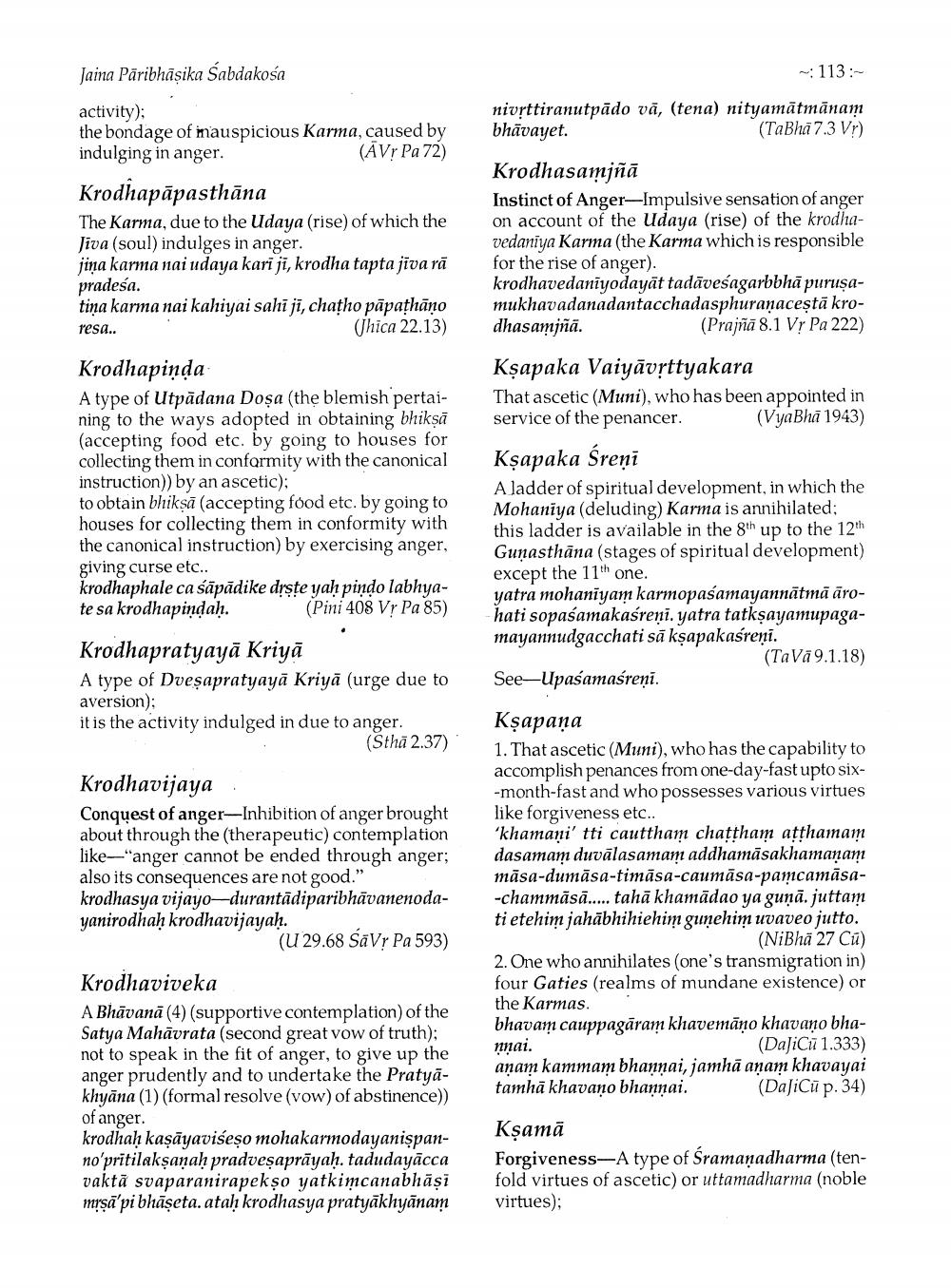________________
Jaina Pāribhāsika Sabdakośa
113:
nivrttiranutpādo vā, (tena) nityamātmānam bhāvayet.
(Tabha 7.3 V)
activity); the bondage of mauspicious Karma, caused by indulging in anger.
(ĀV? Pa 72) Krodhapāpasthāna The Karma, due to the Udaya (rise) of which the Jiva (soul) indulges in anger. jina karma nai udaya kari ji, krodha tapta jiva rā pradeśa. tiņa karma nai kahiyai sahiji, chatho pāpathāņo resa..
(Thica 22.13)
Krodhasamjñā Instinct of Anger-Impulsive sensation of anger on account of the Udaya (rise) of the krodhavedaniya Karma (the Karma which is responsible for the rise of anger). krodhavedaniyodayāt tadāveśagarbbhā puruşamukhavadanadantacchadasphuranaceștā krodhasamjna.
(Prajmã 8.1 VỊ Pa 222)
Krodhapiņda A type of Utpādana Dosa (the blemish pertaining to the ways adopted in obtaining bhiksā (accepting food etc. by going to houses for collecting them in conformity with the canonical instruction)) by an ascetic); to obtain bhikṣā (accepting food etc. by going to houses for collecting them in conformity with the canonical instruction) by exercising anger, giving curse etc.. krodhaphale ca sāpādike drste yah pindo labhyate sa krodhapindah. (Pini 408 V? Pa 85)
Ksapaka Vaiyāvrttyakara That ascetic (Muni), who has been appointed in service of the penancer. (VyaBhā 1943) Ksapaka Sreni A ladder of spiritual development, in which the Mohaniya (deluding) Karma is annihilated; this ladder is available in the 8th up to the 12th Gunasthāna (stages of spiritual development) except the 11th one. yatra mohaniyam karmopasamayannātmā ārohati sopasamakasreņi. yatra tatkşayamupagamayannudgacchati sākṣapakasreni.
(TaVã 9.1.18) SeeUpasamaśreņi.
Krodhapratyayā Kriyā A type of Dveşapratyayā Kriyā (urge due to aversion); it is the activity indulged in due to anger.
(Sthā 2.37)
Krodhavijaya Conquest of anger-Inhibition of anger brought about through the (therapeutic) contemplation like-"anger cannot be ended through anger; also its consequences are not good.” krodhasya vijayo-durantādiparibhāvanenodayanirodhaḥ krodhavijayaḥ.
(U 29.68 ŚãV? Pa 593)
Kșapaņa 1. That ascetic (Muni), who has the capability to accomplish penances from one-day-fast upto six-month-fast and who possesses various virtues like forgiveness etc.. 'khamani' tti cauttham chattham atthamam dasamam duvālasamam addhamāsakhamanam māsa-dumāsa-timāsa-caumāsa-pamcamāsa-chammāsā.... tahā khamādao ya guņā. juttam ti etehim jahābhihiehim gunehim uvaveo jutto.
(NiBhā 27 Cü) 2. One who annihilates (one's transmigration in) four Gaties (realms of mundane existence) or the Karmas. bhavam cauppagāram khavemāņo khavano bhainai.
(DaJiCū 1.333) aņam kammam bhannai, jamhā anam khavayai tamhā khavano bhannai. (DaliCūp. 34)
Krodhaviveka A Bhāvanā (4) (supportive contemplation) of the Satya Mahāvrata (second great vow of truth); not to speak in the fit of anger, to give up the anger prudently and to undertake the Pratyakhyāna (1) (formal resolve (vow) of abstinence)) of anger. krodhah kaşāyaviseşo mohakarmodayanişpanno'pritilaksanaḥ pradveşaprāyaḥ, tadudayācca vaktā svaparanirapekṣo yatkimcanabhāși mrşā'pi bhāṣeta. atah krodhasya pratyākhyānam
Kşamā Forgiveness-A type of śramanadharma (tenfold virtues of ascetic) or uttamadharma (noble virtues);




